Did you know that a reliable battery can enhance your Toyota Tundra's performance by up to 30%? Choosing the right battery isn't just about starting your truck; it's crucial to ensuring longevity and efficiency for all your adventures. With various options available, it's important to know which batteries stand out regarding cold cranking amps and durability. You might be surprised by the specific features that can make all the difference when you're on the road. Let's explore the top contenders to find the best fit for your needs.
Things to Note
- AGM batteries like OPTIMA YellowTop offer excellent cold cranking amps and long reserve capacity for reliable power in the Tundra.
- Starting batteries, such as OPTIMA RedTop, provide robust starting power and are ideal for cold weather conditions.
- Dual-purpose batteries, like OPTIMA YellowTop, cater to accessory-loaded vehicles and provide superior performance for off-road adventures.
- Consider battery maintenance and durability; AGM batteries have lower maintenance needs and higher resistance to vibrations.
OPTIMA Batteries 8020-164 35 RedTop Starting Battery
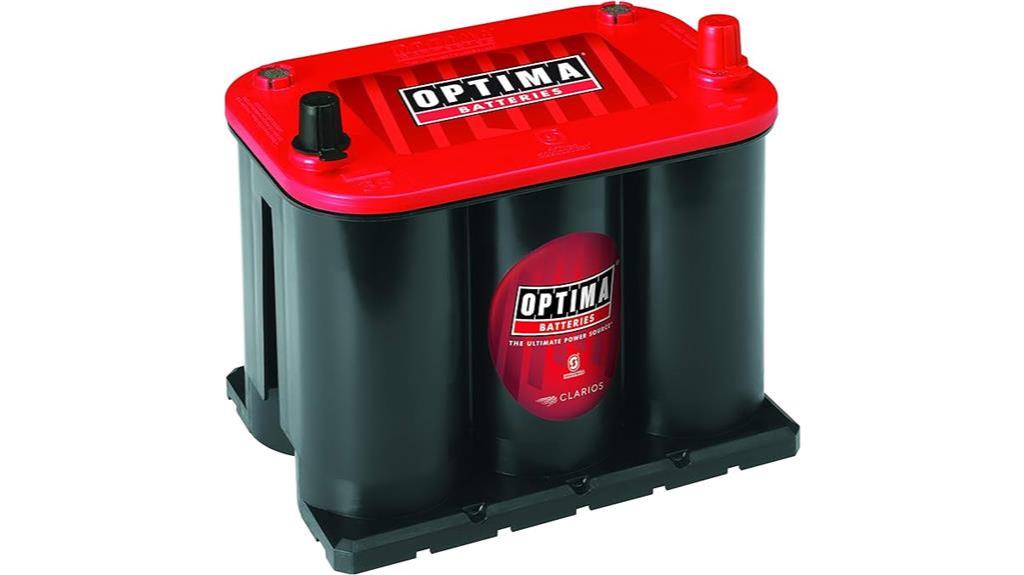
The OPTIMA Batteries 8020-164 35 RedTop Starting Battery is an excellent choice for Toyota Tundra owners seeking reliable performance and durability, particularly in extreme weather conditions.
This 12-volt battery boasts 720 cold cranking amps, ensuring powerful starts even in frigid temperatures. Its SpiralCell design provides a strong, clean power source, enhancing the battery's overall efficiency.
Weighing 31.7 pounds and featuring a leak-proof polypropylene case, it's built to withstand harsh environments. The battery's 90-minute reserve capacity means it'll keep running longer when needed most.
With a robust construction that's 15 times more resistant to vibrations, it's perfect for off-road adventures.
Overall, the OPTIMA RedTop battery combines longevity and performance, making it a top pick for Tundra enthusiasts.
Best For: The OPTIMA Batteries 8020-164 35 RedTop Starting Battery is best for vehicle owners seeking a reliable and durable battery for extreme weather conditions and off-road use.
Pros:
- Exceptional cold cranking amps (720) for reliable starts in cold weather.
- Unique SpiralCell design ensures strong and efficient power delivery.
Cons:
- Some users report performance issues in extremely cold temperatures.
- Customer service experiences regarding warranty claims can be inconsistent.
OPTIMA Batteries 8037-127 D27F YellowTop Starting and Deep Cycle Battery
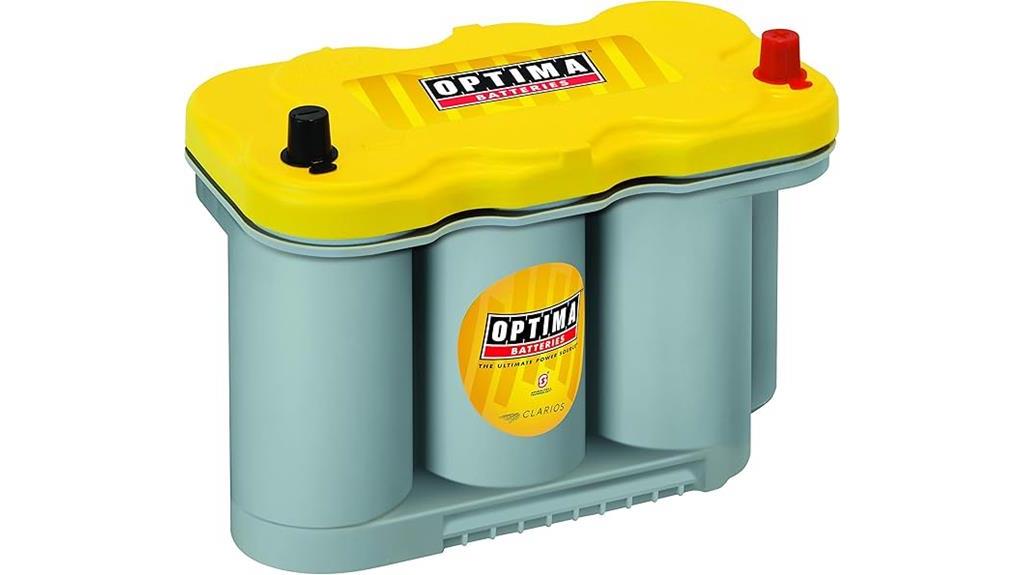
For Toyota Tundra owners seeking reliable starting power and deep-cycle performance, the OPTIMA Batteries 8037-127 D27F YellowTop stands out with its impressive cold cranking amps and durable design.
This dual-purpose AGM battery features Spiralcell Technology, delivering 830 cold cranking amps and 1025 cranking amps, ensuring peak starting power. Weighing 54 pounds and measuring 6.8 x 12.2 x 8.7 inches, it's both compact and powerful.
The YellowTop offers an impressive reserve capacity of 140 minutes, making it ideal for heavy electrical loads like winches and audio systems.
With a maintenance-free design and exceptional vibration resistance, it's built to last, providing over 300 discharge/recharge cycles and performing reliably in various conditions.
Best For: Toyota Tundra owners and other vehicle enthusiasts seeking a reliable dual-purpose battery for both starting power and deep-cycle performance.
Pros:
- Up to two times longer life compared to traditional batteries, enhancing overall value.
- Completely spill-proof and mountable in any position, providing flexibility in installation.
Cons:
- Some users report concerns regarding packaging and shipping quality, potentially affecting initial experience.
- Mixed reviews on longevity in extreme temperatures, which may impact reliability for some users.
OPTIMA Batteries OPT8040-218 D35 YellowTop Dual Purpose Battery
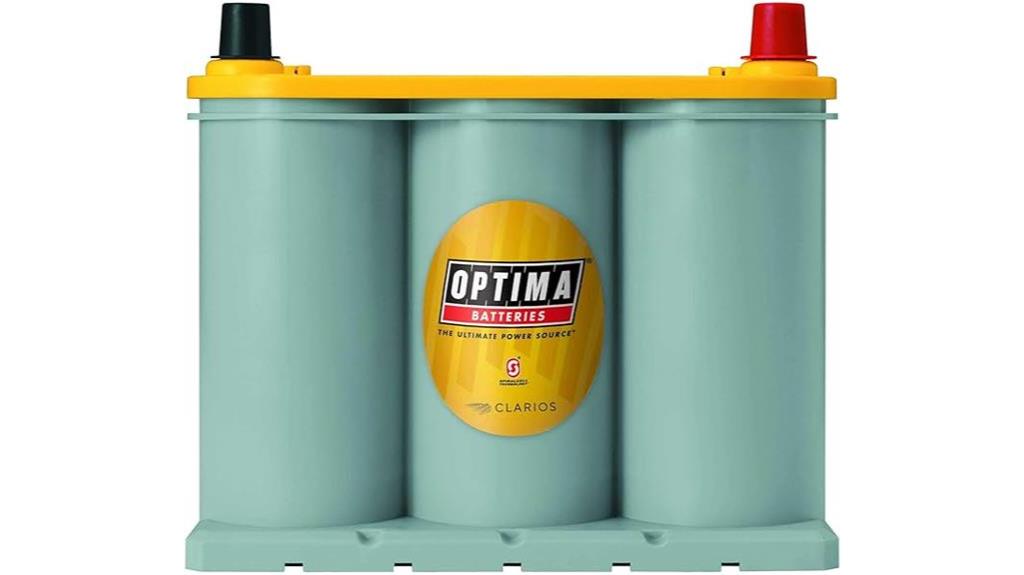
Designed for Toyota Tundra owners who demand reliability and power, the OPTIMA Batteries OPT8040-218 D35 YellowTop Dual Purpose Battery delivers superior starting performance even in the harshest weather conditions.
With 650 cold cranking amps and a reserve capacity of 98 minutes, this 12-volt battery excels in both starting and deep-cycle applications.
Weighing 36.4 pounds and featuring a unique SpiralCell design, it offers 15 times more resistance to vibrations, enhancing its durability.
Ideal for vehicles loaded with accessories, it boasts a low self-discharge rate, allowing for seasonal storage without frequent recharges.
While it enjoys a solid 4.2-star rating, some users have reported battery life issues within 2 to 3 years.
Best For: Toyota Tundra owners seeking a reliable battery that provides optimal performance in extreme weather conditions and supports multiple accessories.
Pros:
- Exceptional starting power with 650 cold cranking amps.
- Highly durable with 15 times more resistance to vibrations.
Cons:
- Some users report battery life issues occurring within 2 to 3 years.
- Higher price compared to traditional wet cell batteries.
OPTIMA Batteries OPT8003-151 8003-151 34R RedTop Starting Battery
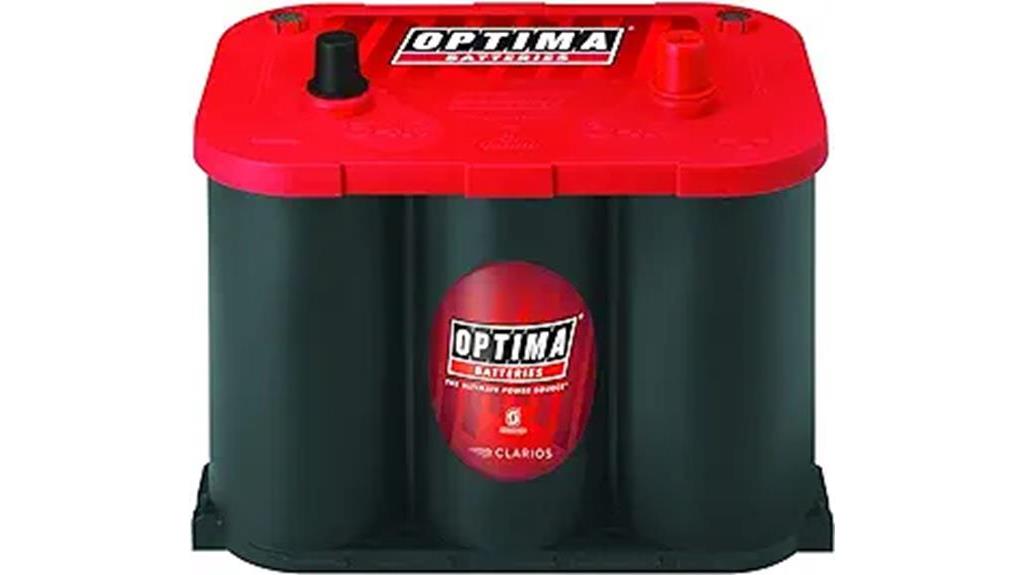
With 800 cold cranking amps and exceptional resistance to vibration, the OPTIMA Batteries OPT8003-151 8003-151 34R RedTop Starting Battery stands out as an ideal choice for Toyota Tundra owners seeking reliable performance in challenging conditions.
Weighing 37.9 pounds and featuring a compact design, this battery offers a reserve capacity of 100 minutes, ensuring consistent power even in adverse weather.
Users praise its easy installation and performance in cold climates, with some enjoying lifespans exceeding a decade.
However, some have reported issues with charge retention after a year and mixed experiences with customer service.
Overall, the RedTop battery provides durability and dependable starting power, making it a strong contender for Tundra enthusiasts.
Best For: Toyota Tundra owners seeking reliable performance and durability in challenging weather conditions.
Pros:
- Exceptional cold cranking amps (800 CCA) for reliable starting power.
- 15 times more resistant to vibration, enhancing durability.
Cons:
- Some users report issues with charge retention after a year.
- Higher prices compared to local alternatives.
OPTIMA Batteries (8171-767 DS46B24R Yellow Top Prius Battery
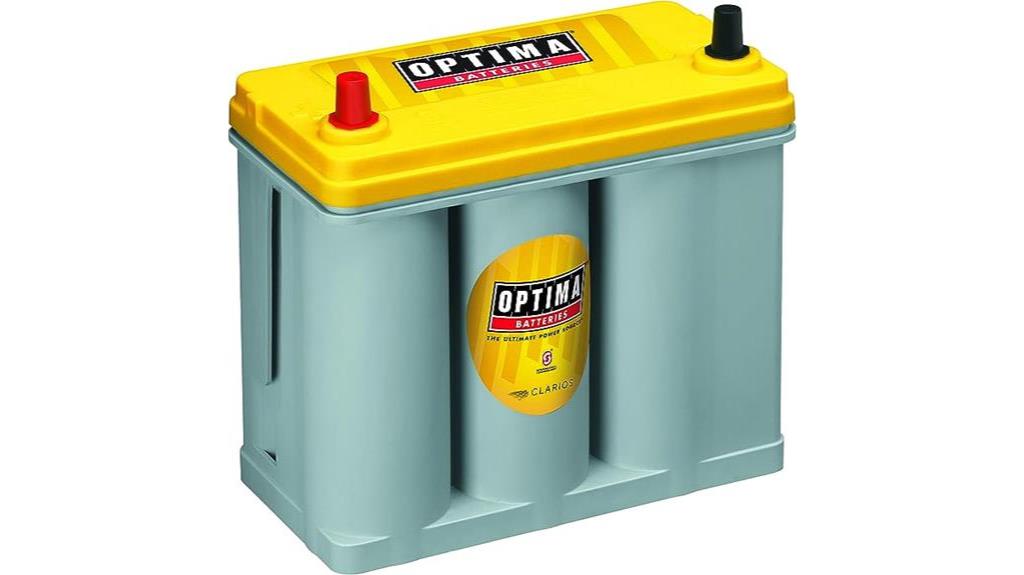
Offering premium cranking power and deep-cycle capability, the OPTIMA YellowTop (8171-767 DS46B24R) battery stands out as an excellent choice for Toyota Tundra owners needing reliable performance in demanding conditions.
This high-performance AGM battery measures 9.94 x 5.06 x 8.94 inches and weighs 26 pounds, providing 450 cold cranking amps and 575 cranking amps. It's designed for accessory-loaded vehicles, making it ideal for trucks with winches and high-demand electronics.
Users appreciate its long lifespan, often exceeding six years, and straightforward installation. While some reported minor modifications, most found it compatible with existing connectors.
With a solid 4.2-star rating and a 30-day return guarantee, the OPTIMA YellowTop remains a trusted choice for Tundra enthusiasts.
Best For: The OPTIMA YellowTop (8171-767 DS46B24R) battery is best for Toyota Prius owners seeking a reliable, high-performance battery for accessory-loaded vehicles.
Pros:
- Premium performance: Offers exceptional cranking power and deep-cycle capability, suitable for high-demand electronics.
- Long lifespan: Users report battery life ranging from 6 to over 8 years, ensuring lasting reliability.
Cons:
- Potential voltage issues: Some users experienced voltage-related problems affecting vehicle systems, leading to warning lights.
- Installation variability: Time to install can vary widely, from 15 minutes to over an hour depending on the model and user experience.
TOYOTA Genuine (74431-0C020) Battery Tray
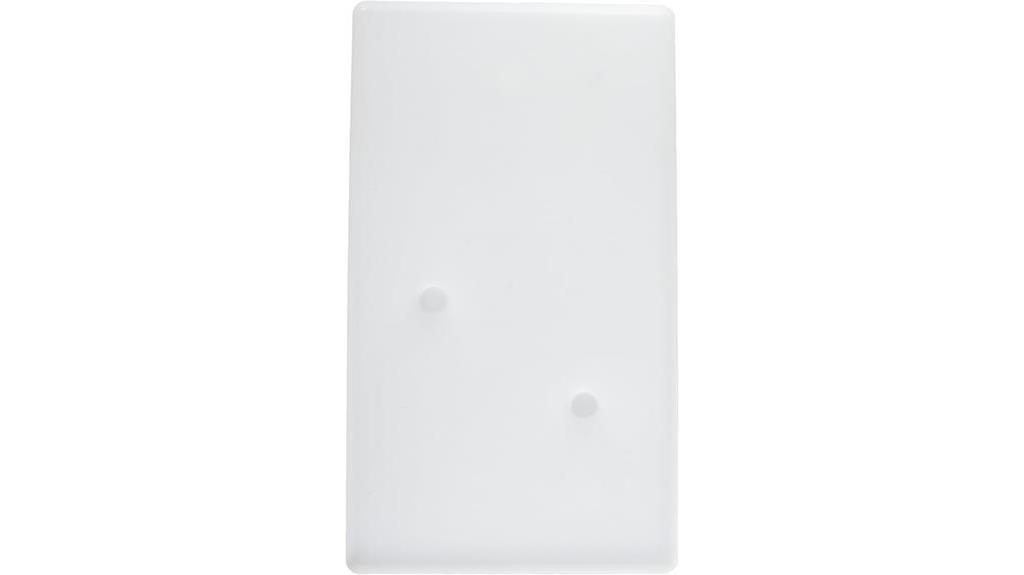
The TOYOTA Genuine (74431-0C020) Battery Tray is an ideal choice for Toyota Tundra owners seeking a reliable and cost-effective solution for battery upgrades.
Weighing just 0.01 ounces and measuring 3.6 cm by 22.1 cm by 34.9 cm, it offers a lightweight and compact design.
This tray, manufactured by Toyota in China, boasts a solid 3.9 out of 5-star customer rating, indicating general satisfaction among users.
It ranks #599 in Automotive Replacement Battery Trays, highlighting its popularity.
Customers appreciate its flexibility and affordability compared to dealership options, making it a preferred choice for those looking to upgrade to a Group 27F battery.
With a 30-day return policy, buyers can feel confident in their purchase.
Best For: Toyota Tundra owners looking for an affordable and compatible battery tray solution for Group 27F battery upgrades.
Pros:
- Cost-effective compared to dealership prices, providing savings for customers.
- Compatible with Group 27F battery upgrades in 5th Gen Toyota 4Runner, enhancing versatility.
Cons:
- Limited customer rating of 3.9 out of 5 stars, indicating some dissatisfaction among users.
- Best Sellers Rank of #1,049,155 suggests it's not a top-selling product in its category.
Interstate Batteries Automotive Battery 12V 63Ah (MTZ-34)
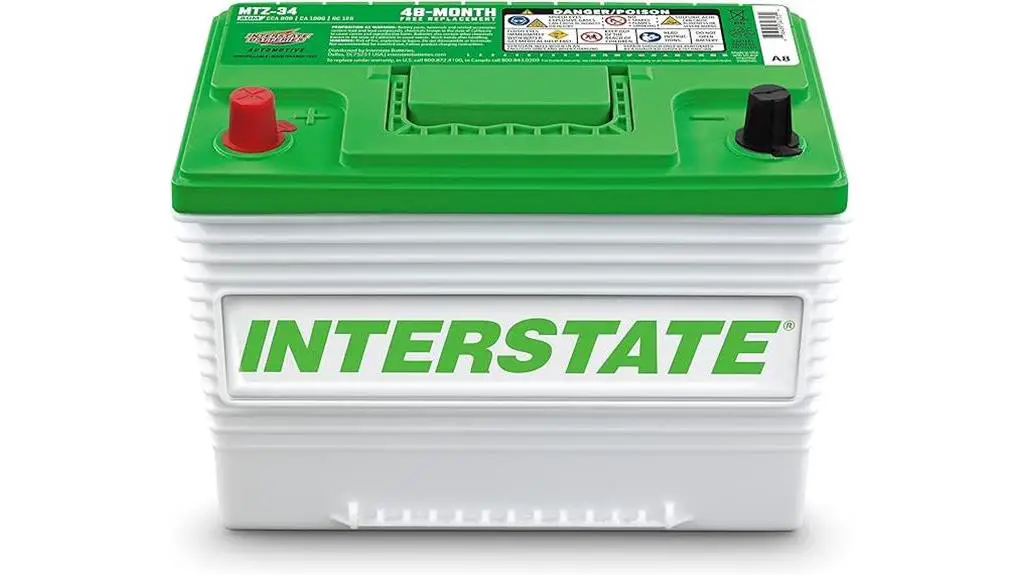
Designed for serious performance, the Interstate Batteries Automotive Battery 12V 63Ah (MTZ-34) delivers an impressive 800 cold cranking amps, making it an excellent choice for Toyota Tundra owners who demand reliability and power.
This AGM battery boasts a service life that's twice as long as conventional AGM batteries and three times longer than flooded options.
Weighing in at 46.6 pounds, it features advanced Matrix Technology, utilizing 99.99% pure lead for deeper cycles and quicker recharges.
With the ability to handle 400 cycles at 80% depth of discharge, it's perfect for vehicles loaded with accessories.
Although it has a solid reputation, some users have reported fitment issues, and its no-return policy can be frustrating.
Best For: The Interstate Batteries Automotive Battery 12V 63Ah (MTZ-34) is best for vehicle owners seeking a high-performance, reliable battery for cars, SUVs, trucks, and vans with multiple accessories.
Pros:
- Long Service Life: Lasts 2X longer than conventional AGM batteries and 3X longer than flooded batteries.
- High Starting Power: Provides 800 CCA, ensuring reliable engine cranking even in cold conditions.
Cons:
- Fitment Issues: Some users experience compatibility problems with specific vehicle models.
- Shipping Concerns: Reports of inadequate packaging leading to damage during delivery.
Factors to Consider When Choosing a Battery for Toyota Tundra
When choosing a battery for your Toyota Tundra, you'll want to take into account several key factors.
Battery type, cold cranking amps, reserve capacity, size, and vibration resistance all play an essential role in performance.
Making the right selections can guarantee your truck runs smoothly and reliably.
Battery Type Selection
Choosing the right battery for your Toyota Tundra involves considering several key factors to guarantee peak performance and reliability. One of the best options is an AGM (Absorbed Glass Mat) battery. These batteries provide superior vibration resistance and can be mounted in any position without the risk of leakage, making them ideal for rugged conditions.
You should also assess the cold cranking amps (CCA) of the battery. For best performance, look for ratings exceeding 700 CCA to guarantee reliable starting power, especially in colder weather. Additionally, evaluate the reserve capacity; aim for at least 90 minutes. This guarantees your vehicle can support electrical accessories and start after prolonged use without needing a recharge.
Compatibility with your Tundra's accessories is another critical factor, particularly if you have high-demand systems like winches, audio systems, or extra lighting.
Cold Cranking Amps
Cold Cranking Amps (CCA) play an essential role in guaranteeing your Toyota Tundra starts reliably in frigid temperatures, as they indicate the battery's ability to deliver power under such conditions. The CCA rating measures how many amps a battery can produce for 30 seconds at 0°F while maintaining at least 7.2 volts.
If you live in an area with harsh winters, it's vital to choose a battery with a CCA rating that meets or exceeds your vehicle's specifications. For full-size trucks like the Tundra, a CCA rating of 650-800 is generally suitable, depending on your engine size and any additional accessories you might have.
Higher CCA ratings mean better starting power, which is essential for heavy-duty vehicles that need extra energy to start in cold weather. Selecting a battery with the right CCA guarantees that your Tundra will crank up without hassle, even when temperatures drop.
Don't underestimate the importance of CCA; it directly impacts your truck's reliability during winter months. So, when you're shopping for a new battery, make sure to pay attention to this critical specification.
Reserve Capacity Importance
Understanding reserve capacity is essential for ensuring your Toyota Tundra can power important components even when the engine is off.
Reserve capacity (RC) is measured in minutes and indicates how long your battery can sustain critical systems without the engine running. If you often find yourself camping or taking long road trips, a higher RC provides the reliability you need.
Batteries with longer reserve capacity can support extra accessories and electronics, ensuring that everything from your GPS to your lights stays operational. This is especially important in extreme weather conditions, where battery performance can dip. A robust reserve capacity helps maintain dependable functionality, giving you peace of mind.
When you're choosing a battery for your Tundra, make sure the reserve capacity meets or exceeds the demands of your vehicle's electrical systems. This will help prevent unexpected failures, keeping you on the road and enjoying your adventures without worry.
Size and Fitment
Selecting the right battery size and fitment for your Toyota Tundra guarantees peak performance and prevents installation headaches. Start by checking the group size specification needed for your Tundra, ensuring it matches the vehicle's designated dimensions and terminal types. This is essential for a proper fit.
Next, measure the battery tray space carefully. If the battery's dimensions exceed this space, you might face installation challenges or even movement while driving, which can impact performance.
Cold cranking amps (CCA) are also important—make sure the battery you choose has a suitable CCA rating, especially if you live in a colder climate where reliable starting is critical.
Don't forget about the terminal configuration; it should match the original equipment to avoid compatibility issues with your battery cables.
Finally, be aware that some Tundra models might need slight modifications or additional support materials for a secure installation, depending on your chosen battery's size and design.
Vibration Resistance Features
When choosing a battery for your Toyota Tundra, considering vibration resistance features is essential to ensuring reliability in rugged conditions. Your Tundra faces significant jolts and movements, especially during off-road driving or towing. A battery that can endure these stresses will help maintain performance and extend its lifespan.
Look for batteries designed with advanced construction features, like SpiralCell technology, which offers up to 15 times greater resistance to vibration than conventional batteries. This enhanced vibration resistance not only prevents internal damage but also minimizes the risk of premature failure, which is vital for your truck's demanding applications.
Selecting a battery with high vibration resistance contributes to consistent power delivery, ensuring peak performance even under heavy loads or in challenging scenarios. By investing in a robust battery, you're enhancing your Tundra's reliability and resilience on various terrains.
Maintenance Requirements
Regular maintenance is key to guaranteeing your Toyota Tundra's battery performs at its best and lasts longer. Start by regularly checking the battery's terminal connections for any corrosion and make certain they're tight. This simple step helps prevent starting issues and maintains peak performance.
If you choose an AGM battery, you'll enjoy lower maintenance compared to traditional flooded batteries, as they're sealed and spill-proof, eliminating the need for water refills. However, it's still vital to keep the battery clean and inspect it for any signs of physical damage or leaks that could impact functionality and lifespan.
Maintaining a proper charge level is essential. Verify your battery doesn't discharge below 50% capacity to prolong its life. Additionally, periodic load testing can help you assess the battery's health and capacity. This is especially important before winter months when cold starts can be more demanding.
Taking these maintenance requirements into account will help you choose a reliable battery for your Tundra, guaranteeing you power up your truck with confidence in any situation.
Warranty and Support
Considering warranty and support can greatly impact your experience with a battery for your Toyota Tundra, especially after making your purchase. When choosing a battery, pay attention to the warranty length. Many options offer warranties ranging from 3 years to just 30 days for returns.
It's essential to understand any specific warranty conditions that may apply, such as the need for proof of purchase or adherence to maintenance guidelines. These conditions can markedly affect your satisfaction if issues arise. Also, check whether the warranty terms cover replacement and under what circumstances.
Keep in mind that warranty honors can vary based on the retailer. Some customers report challenges in claiming warranties when batteries are purchased online, leading to frustration.
To make a more informed decision, review customer feedback regarding warranty support. Experiences can range from timely, helpful service to long delays and unresponsive support teams. Taking the time to understand these aspects can save you headaches down the road, ensuring that you feel confident and supported in your choice of battery for your Toyota Tundra.
Price Considerations
Battery prices for your Toyota Tundra can vary widely, so it's crucial to assess different types and features to find the best fit for your needs. Generally, AGM batteries cost more than traditional lead-acid options, typically ranging from $150 to over $300. This higher price reflects their longer lifespan and superior performance, making them a worthwhile investment if you drive frequently or in extreme conditions.
When choosing a battery, consider the total cost of ownership. While the upfront price matters, the potential savings from longer battery life and reduced maintenance can offset initial expenses. Also, be on the lookout for seasonal discounts and promotions. Prices can fluctuate, so comparing costs across different retailers can help you snag a better deal.
Don't overlook warranties, either. Batteries with longer warranties might carry a higher initial price but could offer better value over time if they last longer. By weighing these price considerations, you'll be better equipped to choose the right battery for your Tundra, balancing performance, longevity, and cost effectively.
Frequently Asked Questions
How Long Do Batteries Typically Last in a Toyota Tundra?
Batteries in a Toyota Tundra typically last around three to five years, depending on various factors.
If you drive frequently in extreme temperatures or short distances, your battery might wear out faster.
Regular maintenance, like checking connections and ensuring the battery's clean, can also extend its life.
You should monitor your battery's performance and replace it when you notice signs of weakness, like slow starts or dimming headlights.
Can I Use a Regular Car Battery in My Tundra?
You might think a regular car battery could work in your Toyota Tundra, but it's not that simple.
Tundras require batteries designed for their specific power needs and size. Using a standard battery may lead to poor performance or even damage.
It's best to stick with batteries that meet your truck's specifications. Always check your owner's manual or consult a professional to confirm you're using the right battery for peak performance.
What Symptoms Indicate a Failing Battery?
If your battery's failing, you'll notice a few telltale signs. Your truck might struggle to start, making slow or clicking sounds.
You may see dim headlights or flickering dashboard lights, especially when you're idling. Additionally, you might experience electrical issues with your accessories.
If you notice a swollen battery case or corrosion around the terminals, it's time to act. Don't wait too long; a failing battery can leave you stranded.
How Do I Properly Maintain My Truck's Battery?
To properly maintain your truck's battery, start by regularly checking the terminals for corrosion and clean them as needed.
Make sure the battery is securely mounted and free of dirt.
Test the battery's voltage periodically, and keep it charged, especially during extreme weather.
If you're not using your truck for a while, consider disconnecting the battery to prevent drainage.
Are There Warranties on Aftermarket Batteries for Toyota Tundra?
Yes, there are warranties on aftermarket batteries for your Toyota Tundra.
Most manufacturers offer warranties ranging from one to three years, depending on the brand and model.
It's essential to check the specific warranty details before purchasing, as some may cover only defects while others might include performance guarantees.
Always keep your receipt and register your battery if required, so you can easily claim any warranty service you might need down the line.
Conclusion
In summary, choosing the right battery for your Toyota Tundra can make all the difference in its performance.
With options like the OPTIMA YellowTop and Interstate MTZ-34, you're equipped for any adventure.
But what if the battery you pick could be the key to releasing your truck's true potential?
The power is in your hands—make your choice wisely, and you may just find yourself conquering the toughest terrains with confidence you never knew you had.